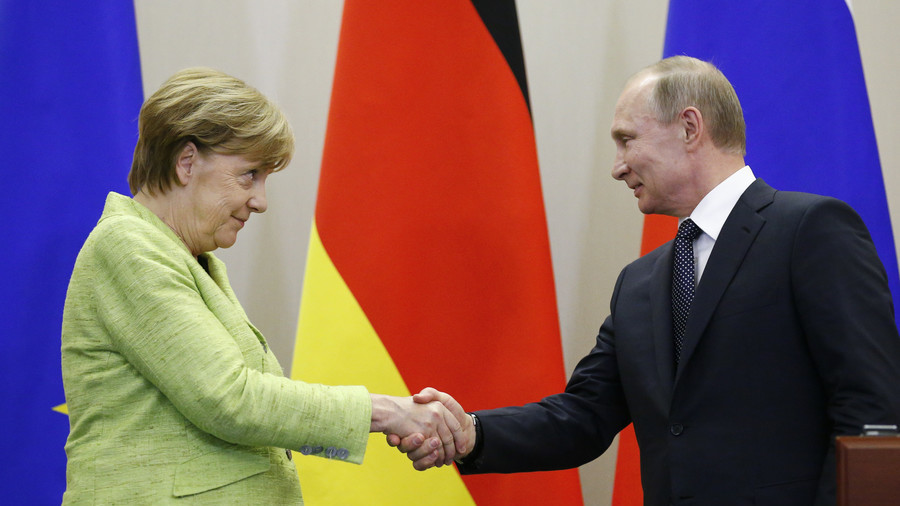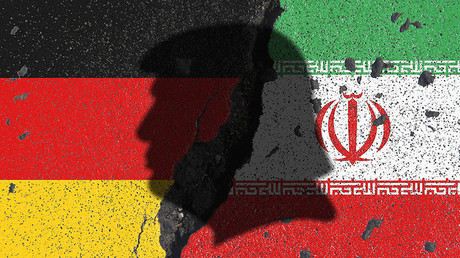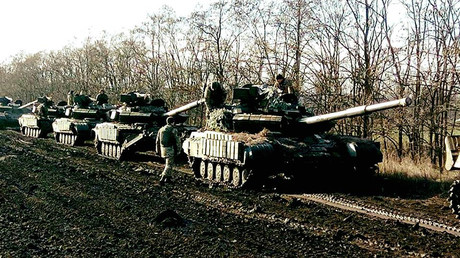Merkel’s 2nd visit to Sochi in a fortnight: Russia-Germany détente on the horizon?

German Chancellor Angela Merkel's working visit to Sochi on Friday could signal a positive shift in EU-Russia relations, as the European bloc reassesses its fealty to Washington.
Merkel came to Sochi at the start of May to meet with Russian President Vladimir Putin – which at the time was her first visit to the country since 2014. Less than a week later, US President Donald Trump announced that he would be withdrawing his country from the Iran nuclear deal, of which Russia and Germany are both signatories. The decision has infuriated Europe, with Merkel going so far as to suggest that Europe can no longer rely upon the United States to ensure its security and maintain international norms.
With Merkel trekking out to Sochi for the second time this month, it appears that Europe, increasingly disillusioned Washington, will seek closer cooperation with Moscow in hopes of salvaging the Iran deal and making headway on a number of other critical international issues.
German public broadcaster Deutsche Welle has even commented ahead of the summit that "a rapprochement between Germany and Russia could be an unexpected consequence of Trump's decision to abandon the nuclear deal with Iran."
Will recent developments lead to a new breakthrough in German (and European) cooperation with Russia? Where will Putin and Merkel see eye-to-eye, and what issues are still causing friction between the two leaders?
Keeping the Iran deal alive
The first item on the Putin-Merkel agenda will undoubtedly be the future of the Iran nuclear deal. Both Germany and Russia have signaled their eagerness to preserve the landmark 2015 accord, which places restrictions on Iran's nuclear capabilities in exchange for sanctions relief.
The issue of the Iranian nuclear deal is probably “the easiest” one on the agenda of the two leaders, professor Peter Schulze, international relations expert at the University of Goettingen, told RT. Moscow, Berlin and even Brussels are all in favor of keeping the deal and are almost equally opposed to the US plans to withdraw from the agreement, he said.
Given Washington’s latest actions, “it would be a logical step” for Germany to “move closer to Moscow” as well as to take a more “pragmatic and moderate” approach to the issue, Schulze added.
Working towards peace in Syria
Compared to other European powers, Germany has shown less and less interest in entangling itself in the ongoing conflict in Syria. Notably, Germany declined to participate in tripartite missile strikes against Syria carried out by the US, UK and France in early April. In comments made on Wednesday, Merkel made it clear that Berlin sees Russia as a key player in any peace settlement.
Closer energy cooperation
Merkel's visit will coincide with the start of preparatory work for the construction of the Nord Stream 2 gas pipeline off the coast of Germany. The pipeline will follow the track of the existing Nord Stream 1 and will double the amount of Russian gas arriving in Germany. The project, which should be finished in late 2019, was opposed by Washington and several Eastern European states, which claimed that it could be used by Moscow to exert economic influence over the EU.
With Germany now reassessing its relationship with Washington, it's possible that construction of the pipeline will be less hindered by external political pressure.
A frozen conflict in Ukraine?
One point of serious disagreement between Putin and Merkel has been the conflict in Eastern Ukraine, with Germany providing both political and military support to Kiev. Ongoing disagreements over enforcement of the Minsk Accords, as well as the status of Crimea, will likely make noticeable headway on these issues difficult.
The conflict in Ukraine remains the major “stumbling block” that “impedes improvement of relations between Russia and Europe,”Schulze admitted. At the same time, he expressed cautious optimism about the possible outcome of potential talks between Putin and Merkel on this issue.
“We [will] see some improvement of the Ukrainian situation,” he told RT, adding that the talks could lead to another push for the implementation of the Minsk Agreements, with both Moscow and Berlin exerting pressure on the parties to the conflict.
However, Germany is unlikely to initiate the lifting of anti-Russian sanctions, which were imposed by the EU, the professor said. Such a move could potentially lead to an “enormous conflict” with Washington as well as leave Berlin “isolated,” as many EU members, including the Baltic States and Poland, still actively support the US policies, he explained, adding that no country in the EU is ready to take those risks at the moment.
A new chapter for German-Russian relations?
But even with serious differences on Ukraine, Berlin has signaled that it is open to turning a new page with Moscow, especially on pressing international issues.
"We need Russia as a partner to settle regional conflicts, for disarmament and as an important pillar of multilateralism,"newly appointed Foreign Minister Heiko Maas said in April, adding, "we are therefore open for dialogue and are trying to rebuild trust bit by bit if Russia is ready."
“This is probably Merkel’s last [term] in office. So she has to show something to history and I don’t think she wants to go down in the historical past as the grave digger of German-Russian relations,” Schulze told RT.
Given the fact that German Foreign Minister Maas is a “newcomer to the job who has got no diplomatic experiences,” it is Merkel who is likely to give directions in the field of foreign policy, the professor said. He added that “if she is well consulted by her advisors then [Merkel] should, given the very difficult relationship with the US, be at least more diplomatic, more open and more flexible [in relations with Moscow] than the foreign minister of Germany,” who is known for his tough stance on Russia.




0 Comments:
Post a Comment
Subscribe to Post Comments [Atom]
<< Home